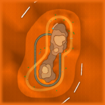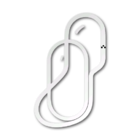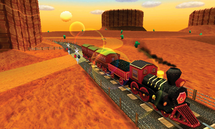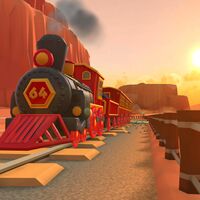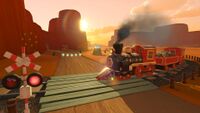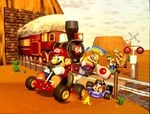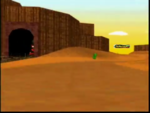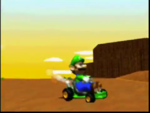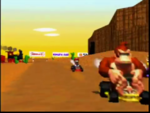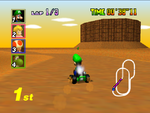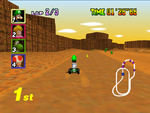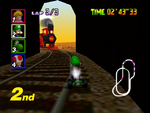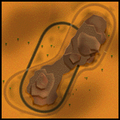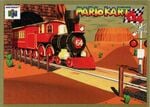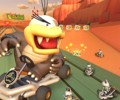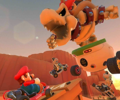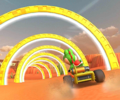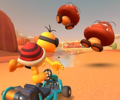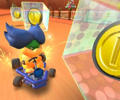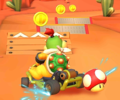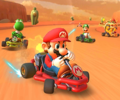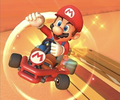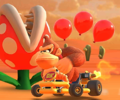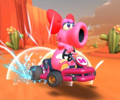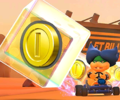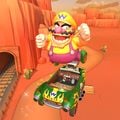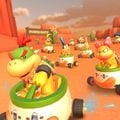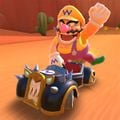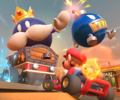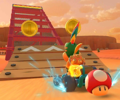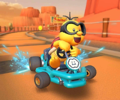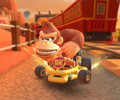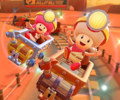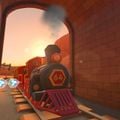N64 Kalimari Desert: Difference between revisions
(Previous way was worded better) Tag: Undo |
(Incorporated trivia) |
||
| Line 27: | Line 27: | ||
The race starts out next to a large cliff formation. Upon the first turn, racers see how empty the desert really is. At the end of the turn, the racers encounter the [[Train (obstacle)|train]] for the first time. After passing the tracks, the players race alongside the track of the train (though it is in a cave and not visible), eventually running into it a second time. After this encounter, the racers race along the edge of the map and eventually advance back to the finish line. | The race starts out next to a large cliff formation. Upon the first turn, racers see how empty the desert really is. At the end of the turn, the racers encounter the [[Train (obstacle)|train]] for the first time. After passing the tracks, the players race alongside the track of the train (though it is in a cave and not visible), eventually running into it a second time. After this encounter, the racers race along the edge of the map and eventually advance back to the finish line. | ||
If the player drives over the sand, their kart | If the player drives over the sand, their kart moves slower, and if they enter the darker portion of the sand, Lakitu pulls them out, as it is an out-of-bounds area. | ||
The course's most notable feature is the two trains that go through a mesa. The trains constantly move around the track, often passing through the racers' path. Depending on what mode is being played, the trains may or may not have coaches attached to them: when playing in single-player, the trains each have a tender and passenger cars, whereas in two-player mode, the trains' lengths are halved, having a tender and only one passenger car each, and in three- or four-player mode, the trains consist only of the engine, with no tender or passenger cars present. If the player runs into one of them, they | The course's most notable feature is the two trains that go through a mesa. The trains constantly move around the track, often passing through the racers' path. Depending on what mode is being played, the trains may or may not have coaches attached to them: when playing in single-player, the trains each have a tender and passenger cars, whereas in two-player mode, the trains' lengths are halved, having a tender and only one passenger car each, and in three- or four-player mode, the trains consist only of the engine, with no tender or passenger cars present. If the player runs into one of them, they are thrown in the air. CPU drivers pull their brakes and stop at the railroad crossings when a train passes by. It is possible to drive on the train's track; however, this costs the racer time. It is possible, but very difficult, to cross the train track while the train is there by driving through the gap between the coaches. If a player travels through the train tunnel, they typically bypass the finish line, not moving on to the next lap as the other racers. | ||
The railroad crossing sounds are taken from real Japanese National Railway railroad crossing signals with electronic bells. In addition, the railroad crossing signs' lettering appears to be mirrored. The signs in later iterations of the course are unlettered. | |||
===Shortcut=== | ===Shortcut=== | ||
| Line 37: | Line 39: | ||
==''Mario Kart 7''== | ==''Mario Kart 7''== | ||
[[File:KalimariDesertMK7.png|thumb|215px|left|Kalimari Desert in ''Mario Kart 7'']] | [[File:KalimariDesertMK7.png|thumb|215px|left|Kalimari Desert in ''Mario Kart 7'']] | ||
Kalimari Desert returns in ''Mario Kart 7'' as the first course of the [[Leaf Cup]]. There are now two shortcut ramps near the end of the first corner and before the third corner of the track to accommodate the new gliding feature, allowing racers to glide over the trains. The players can also use mushrooms to gain easy access to these ramps. Several wooden ramps also litter the inside and outside of the track, and as always, can be tricked to gain a small boost. However, the train tunnel can no longer be entered because it is now an out-of-bounds area, making the lap glitch impossible in this game. The trains are also shorter: they have three wagons while they had five in the original version of the track, and they now seem to | Kalimari Desert returns in ''Mario Kart 7'' as the first course of the [[Leaf Cup]]. There are now two shortcut ramps near the end of the first corner and before the third corner of the track to accommodate the new gliding feature, allowing racers to glide over the trains. The players can also use mushrooms to gain easy access to these ramps. Several wooden ramps also litter the inside and outside of the track, and as always, can be tricked to gain a small boost. However, the train tunnel can no longer be entered because it is now an out-of-bounds area, making the lap glitch impossible in this game. The trains are also shorter: they have three wagons while they had five in the original version of the track, and they now seem to travel more slowly. | ||
Unlike in ''Mario Kart 64'', the mini-map of this course does not show the path of the train track. | Much like in ''Mario Kart 64'', two trains are present, but only one train is present when doing online multiplayer races. Unlike in ''Mario Kart 64'', the mini-map of this course does not show the path of the train track. The electric crossing bell sounds are also replaced with more appropriate American-style mechanical crossing bell sounds. Later versions of the course would retain this change. | ||
{{br|left}} | {{br|left}} | ||
| Line 72: | Line 72: | ||
Kalimari Desert reappears in ''[[Mario Kart 8 Deluxe]]'' as part of Wave 2 of the [[Mario Kart 8 Deluxe – Booster Course Pass|Booster Course Pass]]. It is the third course of the [[Turnip Cup]]. It is based on its ''Mario Kart Tour'' design, but has been given a major graphical update. This time, in a similar vein to the city races from ''Mario Kart Tour'', Kalimari Desert combines both the original along with Kalimari Desert 2 from ''Tour'' into one race, with the layout changing between laps. This makes it the first course in the game that is not a course from ''Mario Kart Tour'' to change its layout between laps/sections and start and end in the same place. This version of Kalimari Desert is also the only course in the series to use both laps and sections, as well as the only course in the game to use both the classic and modern ''Mario Kart'' logos for the banners. | Kalimari Desert reappears in ''[[Mario Kart 8 Deluxe]]'' as part of Wave 2 of the [[Mario Kart 8 Deluxe – Booster Course Pass|Booster Course Pass]]. It is the third course of the [[Turnip Cup]]. It is based on its ''Mario Kart Tour'' design, but has been given a major graphical update. This time, in a similar vein to the city races from ''Mario Kart Tour'', Kalimari Desert combines both the original along with Kalimari Desert 2 from ''Tour'' into one race, with the layout changing between laps. This makes it the first course in the game that is not a course from ''Mario Kart Tour'' to change its layout between laps/sections and start and end in the same place. This version of Kalimari Desert is also the only course in the series to use both laps and sections, as well as the only course in the game to use both the classic and modern ''Mario Kart'' logos for the banners. | ||
The first lap takes the player around the standard Kalimari Desert route, though [[arrow field]]s can be seen blocking off the path to the train tracks and train tunnel entrance that's next to the first railroad crossing. When the second lap begins, the route starts following that of Kalimari Desert 2, where a large red ramp commonly seen in ''Mario Kart Tour''{{'}}s T and R/T courses appears at the second railroad crossing to divert the player onto the tracks. Like the arrow fields, the ramp is independent to each player in multiplayer, meaning that it only appears for each player on their second lap, while it is invisible to players that are on the first or third lap. The third lap begins after the player enters the tunnel. After exiting the tunnel, the route | The first lap takes the player around the standard Kalimari Desert route, though [[arrow field]]s can be seen blocking off the path to the train tracks and train tunnel entrance that's next to the first railroad crossing. When the second lap begins, the route starts following that of Kalimari Desert 2, where a large red ramp commonly seen in ''Mario Kart Tour''{{'}}s T and R/T courses appears at the second railroad crossing to divert the player onto the tracks. Like the arrow fields, the ramp is independent to each player in multiplayer, meaning that it only appears for each player on their second lap, while it is invisible to players that are on the first or third lap. The third lap begins after the player enters the tunnel. After exiting the tunnel, the route finishes as normal. | ||
In all three laps, upon reaching the first railroad crossing, the player can choose to either continue going on the main route, or go along the train tracks. However, the [[Item Box]] placements do change with each lap, with two [[Double Item Box]]es only being present on the train tracks during the final lap. Regardless of the player's decision though, the two paths meet at the second railroad crossing. | In all three laps, upon reaching the first railroad crossing, the player can choose to either continue going on the main route, or go along the train tracks. However, the [[Item Box]] placements do change with each lap, with two [[Double Item Box]]es only being present on the train tracks during the final lap. Regardless of the player's decision though, the two paths meet at the second railroad crossing. | ||
| Line 78: | Line 78: | ||
Like Kalimari Desert 2, there is only one train instead of two, though the train moves much faster and once again hurts racers who come in contact with it, like the versions prior to ''Tour''. The fence on the left side of the train tracks has been removed, and the [[Glide Ramp]] after the first railroad crossing was moved up and is also closer to the track, presumably to accommodate Kalimari Desert 2's layout (as in ''Tour'', the ramp is blocked off). Inside the tunnel, lights have been added onto the walls. The eagles seen in [[Shy Guy Falls]] now fly above the course. The music has been rearranged with more live instruments, as well as trumpets in place of the whistles in the original. The minimap again shows the glider ramp locations on it, as was the case in ''Mario Kart 7''. Pipes have been added to the tops of some mesas. | Like Kalimari Desert 2, there is only one train instead of two, though the train moves much faster and once again hurts racers who come in contact with it, like the versions prior to ''Tour''. The fence on the left side of the train tracks has been removed, and the [[Glide Ramp]] after the first railroad crossing was moved up and is also closer to the track, presumably to accommodate Kalimari Desert 2's layout (as in ''Tour'', the ramp is blocked off). Inside the tunnel, lights have been added onto the walls. The eagles seen in [[Shy Guy Falls]] now fly above the course. The music has been rearranged with more live instruments, as well as trumpets in place of the whistles in the original. The minimap again shows the glider ramp locations on it, as was the case in ''Mario Kart 7''. Pipes have been added to the tops of some mesas. | ||
Unlike the other tracks in the Booster Course Pass which change routes every lap (aside from {{classic-link|Tour|London Loop}}), Kalimari Desert allows racers to drive the whole length of the track in reverse without [[Lakitu]] picking them up or any obstructions; if this is done, the game gets confused and load various course elements in advance as racers traverse the course backwards, including arrow fields and the ramp that leads players onto the train tracks during lap 2. | |||
{{br|left}} | {{br|left}} | ||
| Line 279: | Line 280: | ||
==Trivia== | ==Trivia== | ||
*Six years prior to Kalimari Desert being added to ''Mario Kart 8 Deluxe'', in June 2016, the official Nintendo UK Twitter account posted a screenshot of Toad and Wario crashing into the train on the course in ''[[Mario Kart 64]]'' captioned "Good things come to those who wait," though it was tagged with the hashtag "#MK8."<ref>@NintendoUK (June 4, 2016). [https://twitter.com/nintendouk/status/738777798060482560 "''Good things come to those who wait. #MK8''"] ''Twitter''. Retrieved August 30, 2022.</ref> | *Six years prior to Kalimari Desert being added to ''Mario Kart 8 Deluxe'', in June 2016, the official Nintendo UK Twitter account posted a screenshot of Toad and Wario crashing into the train on the course in ''[[Mario Kart 64]]'' captioned "Good things come to those who wait," though it was tagged with the hashtag "#MK8."<ref>@NintendoUK (June 4, 2016). [https://twitter.com/nintendouk/status/738777798060482560 "''Good things come to those who wait. #MK8''"] ''Twitter''. Retrieved August 30, 2022.</ref> | ||
Revision as of 20:27, January 6, 2023
- This article is about the race course from Mario Kart 64. For the location in Paper Mario with the same Japanese name, see Dry Dry Desert (Paper Mario). For the race course from Mario Kart: Double Dash!! with the previously mentioned name, see GCN Dry Dry Desert.
Kalimari Desert (named Kara Kara Desert on a few occasions)[1][2] is the fourth and final race of the Mushroom Cup in Mario Kart 64, the first race of the Leaf Cup in Mario Kart 7, and the third race of the Turnip Cup in Mario Kart 8 Deluxe. The course also appears in Mario Kart Tour, debuting in the Tokyo Tour. In Mario Kart Tour, there exists a rerouted version of this course called Kalimari Desert 2, which takes racers into the tunnel.
The name of the course is a portmanteau of "Kalahari," which is a real-life desert in Africa, and "calamari," the word used for squid-based food. In Paper Mario, a train known as the K64 is based on the train in the course, and when the player rides on it, an arrangement of the course's theme plays.
Mario Kart 64
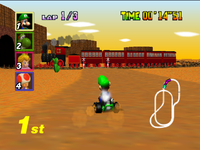
Course layout
The race starts out next to a large cliff formation. Upon the first turn, racers see how empty the desert really is. At the end of the turn, the racers encounter the train for the first time. After passing the tracks, the players race alongside the track of the train (though it is in a cave and not visible), eventually running into it a second time. After this encounter, the racers race along the edge of the map and eventually advance back to the finish line.
If the player drives over the sand, their kart moves slower, and if they enter the darker portion of the sand, Lakitu pulls them out, as it is an out-of-bounds area.
The course's most notable feature is the two trains that go through a mesa. The trains constantly move around the track, often passing through the racers' path. Depending on what mode is being played, the trains may or may not have coaches attached to them: when playing in single-player, the trains each have a tender and passenger cars, whereas in two-player mode, the trains' lengths are halved, having a tender and only one passenger car each, and in three- or four-player mode, the trains consist only of the engine, with no tender or passenger cars present. If the player runs into one of them, they are thrown in the air. CPU drivers pull their brakes and stop at the railroad crossings when a train passes by. It is possible to drive on the train's track; however, this costs the racer time. It is possible, but very difficult, to cross the train track while the train is there by driving through the gap between the coaches. If a player travels through the train tunnel, they typically bypass the finish line, not moving on to the next lap as the other racers.
The railroad crossing sounds are taken from real Japanese National Railway railroad crossing signals with electronic bells. In addition, the railroad crossing signs' lettering appears to be mirrored. The signs in later iterations of the course are unlettered.
Shortcut
- If the player has a Star and activates it just before entering the tunnel, they move on to the next lap, effectively shortcutting ahead of the others. This trick only works during the first two laps.
- Although the instruction manual implies that going through the train tunnel is a shortcut, it takes longer to go through the tunnel to the other end of the course than it does to go on the main road, although the manual may be referring to the previous shortcut.
Mario Kart 7
Kalimari Desert returns in Mario Kart 7 as the first course of the Leaf Cup. There are now two shortcut ramps near the end of the first corner and before the third corner of the track to accommodate the new gliding feature, allowing racers to glide over the trains. The players can also use mushrooms to gain easy access to these ramps. Several wooden ramps also litter the inside and outside of the track, and as always, can be tricked to gain a small boost. However, the train tunnel can no longer be entered because it is now an out-of-bounds area, making the lap glitch impossible in this game. The trains are also shorter: they have three wagons while they had five in the original version of the track, and they now seem to travel more slowly.
Much like in Mario Kart 64, two trains are present, but only one train is present when doing online multiplayer races. Unlike in Mario Kart 64, the mini-map of this course does not show the path of the train track. The electric crossing bell sounds are also replaced with more appropriate American-style mechanical crossing bell sounds. Later versions of the course would retain this change.
Mario Kart Tour
Kalimari Desert reappears in Mario Kart Tour, starting with the Tokyo Tour. The course's starting line now features a wooden banner with the classic Mario Kart logo on it and a wooden wagon wheel resting along the right side of the post, rather than taking its appearance from Mario Kart 64 and Mario Kart 7. Since racers are always moving forward, colliding into the train causes them to launch over it unharmed while they perform a Jump Boost. The train can also be knocked into the air with a Super Horn, a Mega Mushroom or a Bowser's Shell. This course is a favorite of Ludwig, Morton, Hammer Bro, Yellow Toad (Pit Crew), Green Shy Guy, Peach (Explorer), Yoshi (Kangaroo), Luigi (Vacation), Daisy (Farmer), Cat Mario, Shy Guy (Pastry Chef), and Kamek. It can also be a favorite of Mario (Halloween) and Meowser if they reach level 3, and Waluigi and Lakitu (Party Time) if they reach level 6.
The course uses the musical arrangement from Mario Kart 7 rather than the original.
Kalimari Desert also has a reverse variant, a trick variant, and a reverse/trick variant, referred to as Kalimari Desert R, Kalimari Desert T, and Kalimari Desert R/T, respectively. The former two were introduced along with the normal variant in the Tokyo Tour, while the latter was introduced in the 2019 Holiday Tour.
N64 Kalimari Desert 2
Starting from the Wild West Tour, a rerouted version of this track known as Kalimari Desert 2 (N64 Kalimari Desert 2 in-game when selected) is featured. It has two sections: one that starts on the main route but switches to the railroad section at the second intersection, and the other that starts in the tunnel and goes back to the main route again at the second intersection, after which it continues on like normal. The course is the only course in Mario Kart Tour to use both the classic and modern Mario Kart logos, with the starting banner using the classic logo and the banner in the train tunnel using the modern logo. Kalimari Desert 2 is a favorite of Yellow Toad (Pit Crew), Peach (Explorer), Cat Peach, Bowser Jr. (Pirate), Pauline (Party Time), Mario (Sunshine), Luigi (Lederhosen), Mario (Aviator), Dry Bones (Gold), Wario (Cowboy), and the Bronze Mii Racing Suit. This course is also a favorite of Captain Toad, Toadette (Explorer), and Dixie Kong once they reach level 6. The course appears as Kalimari Desert 2R (reverse) and Kalimari Desert 2T (with ramps), as well as Kalimari Desert 2R/T (reverse and with ramps) which was introduced later in the Toad vs. Toadette Tour.
The first section begins from the regular starting line. The course starts out following the same path as the original, with the first glider shortcut still being accessible. However, a wooden ramp has been added shortly before the first railroad crossing, and ramps with Dash Panels appear on both sides of the first intersection allowing racers to jump over the railroad. The course continues and curves to the right toward the tracks, though the glider shortcut normally found in this area is blocked off to prevent racers from skipping the railroad section entirely. At the second railroad crossing, racers are rerouted onto the railroad. The course continues on the tracks, with the second section of the course beginning from the entrance of the railroad tunnel near the starting line, or from the other entrance to the tunnel in the Reverse variant. The train starts out right outside the tunnel near the first intersection in the normal and Reverse variants. Upon reaching the second intersection again, racers are diverted back onto the normal course to continue along the original path. Wooden trick ramps have been added onto the path shortly after this intersection and before the final turn leading to the Finish Line.
In the trick variant, many ramps are added. Rather than jumping over the first intersection, this variant has a ramp bring racers onto the railroad tracks, dropping them onto the tracks shortly after the first crossing. Upon leaving the tunnel, racers are instead diverted back onto the main path either by going up a curved ramp and tricking off of it or by driving through an opening in the ramp. After that, the course is mostly similar to Kalimari Desert T with some differences such as a large ramp being added near the Finish Line. In the reverse and trick variant, the track starts off like the normal reverse variant. When it gets near the crossing, there is a ramp that puts racers on the track. Upon landing on the track, it continues like the trick variant, but with different ramps. Upon leaving the tunnel, racers are then diverted onto the normal track by another ramp and continues like the reverse variant, but with elements from Kalimari Desert T, like a ramp above the first crossing.
Only one train is present on the track in all variations, moving much slower than the original trains since it now shares the tracks with the racers. The train always moves around the tracks in the opposite direction the racers would, and as such, the train travels opposite to its normal direction in the Reverse variant.
Appearances
Combining the totals for the two different iterations together, Kalimari Desert has appeared in forty-two different tours, as of the Animal Tour, the most out of any course to date, beating the second most frequent course, DS Waluigi Pinball, by fourteen tours.
For this course's tour appearances, see List of N64 Kalimari Desert tour appearances in Mario Kart Tour.
Mario Kart 8 Deluxe
Kalimari Desert reappears in Mario Kart 8 Deluxe as part of Wave 2 of the Booster Course Pass. It is the third course of the Turnip Cup. It is based on its Mario Kart Tour design, but has been given a major graphical update. This time, in a similar vein to the city races from Mario Kart Tour, Kalimari Desert combines both the original along with Kalimari Desert 2 from Tour into one race, with the layout changing between laps. This makes it the first course in the game that is not a course from Mario Kart Tour to change its layout between laps/sections and start and end in the same place. This version of Kalimari Desert is also the only course in the series to use both laps and sections, as well as the only course in the game to use both the classic and modern Mario Kart logos for the banners.
The first lap takes the player around the standard Kalimari Desert route, though arrow fields can be seen blocking off the path to the train tracks and train tunnel entrance that's next to the first railroad crossing. When the second lap begins, the route starts following that of Kalimari Desert 2, where a large red ramp commonly seen in Mario Kart Tour's T and R/T courses appears at the second railroad crossing to divert the player onto the tracks. Like the arrow fields, the ramp is independent to each player in multiplayer, meaning that it only appears for each player on their second lap, while it is invisible to players that are on the first or third lap. The third lap begins after the player enters the tunnel. After exiting the tunnel, the route finishes as normal.
In all three laps, upon reaching the first railroad crossing, the player can choose to either continue going on the main route, or go along the train tracks. However, the Item Box placements do change with each lap, with two Double Item Boxes only being present on the train tracks during the final lap. Regardless of the player's decision though, the two paths meet at the second railroad crossing.
Like Kalimari Desert 2, there is only one train instead of two, though the train moves much faster and once again hurts racers who come in contact with it, like the versions prior to Tour. The fence on the left side of the train tracks has been removed, and the Glide Ramp after the first railroad crossing was moved up and is also closer to the track, presumably to accommodate Kalimari Desert 2's layout (as in Tour, the ramp is blocked off). Inside the tunnel, lights have been added onto the walls. The eagles seen in Shy Guy Falls now fly above the course. The music has been rearranged with more live instruments, as well as trumpets in place of the whistles in the original. The minimap again shows the glider ramp locations on it, as was the case in Mario Kart 7. Pipes have been added to the tops of some mesas.
Unlike the other tracks in the Booster Course Pass which change routes every lap (aside from Template:Classic-link), Kalimari Desert allows racers to drive the whole length of the track in reverse without Lakitu picking them up or any obstructions; if this is done, the game gets confused and load various course elements in advance as racers traverse the course backwards, including arrow fields and the ramp that leads players onto the train tracks during lap 2.
Profiles
Mario Kart 64
- Instruction manual bio: The trick is to time it so that the steam locomotive that crosses the course won't block you. If the train is crossing in front of you, you should temporarily stop. It's very dangerous to enter the train tunnel, even if it is a shortcut...
- Webpage bio: A desert race with frequent run-ins with a old-fashioned iron horse.[3]
Mario Kart Tour
- Mario Kart Tour Twitter: It's time for the Wild West Tour! What says "Wild West" more than the N64 Kalimari Desert 2 course? Trek through the tunnel or coast along train tracks. Just ensure the sandstorm doesn't choke your engine![4]
Sponsors
Mario Kart 64
Mario Kart 7
- KoopaKart (Signs)
- Luigi Raceway (Signs)
- Nintendo (Signs)
- Shoot! (Signs)
- Super Mario (Signs)
- Yoshi (Signs)
Mario Kart Tour / Mario Kart 8 Deluxe
- Mario Work Gear (Signs)
- BaNaNa Boy (Signs)
- Red Shell Strike Equipment (Signs)
- Bullet Bill Speed Trial (Signs)
- 1-Up Fuel (Signs)
- Green Shell Taxi (Signs)
Gallery
Mario Kart 64
Artwork depicting Mario and other racers in the desert
Mario Kart 7
Koopa Troopa at the starting line
Shy Guy racing on the course
Shy Guy in the Cact-X
Luigi racing on the course
Mario Kart Tour
Kalimari Desert
Course icons
The course icon of the Smash Small Dry Bones bonus challenge held on this course
The course icon of the Vs. Mega Dry Bowser bonus challenge held on this course
The course icon of the Ring Race bonus challenge held on this course
The course icon of the Goomba Takedown bonus challenge held on this course
The course icon of the Break Item Boxes bonus challenge held on this course
The course icon of the Combo Attack bonus challenge held on Kalimari Desert T
The course icon of the Big Reverse Race bonus challenge held on this course
The course icon of the Do Jump Boosts bonus challenge held on this course
The course icon of the Time Trial bonus challenge held on this course
The course icon of the Steer Clear of Obstacles bonus challenge held on this course
Screenshots
View of the train
Wario tricking in the Flame Flyer
Bowser Jr. and the Koopalings in Koopa Clowns on the Reverse variant
Wario tricking in the Bruiser
Baby Luigi gliding in the Green Kiddie Kart with the Blooper Hanafuda
Wario (Cowboy) drifting in the Brown Offroader
Pauline (Rose) tricking in the Lime Tea Coupe and Peach (Vacation) tricking in the Sweet Daytripper
Kalimari Desert 2
Course icons
The course icon of the vs. Mega King Bob-omb bonus challenge held on this course
The course icon of the Combo Attack bonus challenge held on Kalimari Desert 2T
The course icon of the Time Trial bonus challenge held on this course
The course icon of the Snap a Photo bonus challenge held on Kalimari Desert 2R/T
Screenshots
Nabbit driving past Mario, Yoshi, Donkey Kong, Bowser and Wario (Cowboy) on the course
Nabbit driving towards an event token in the Carrot Kart
Wario (Cowboy), Monty Mole, and Nabbit tricking on the course
Mario Kart 8 Deluxe
Wario and several others driving through the course
- MK8D Kalimari Desert Arrow Field.png
Unlike other courses, N64 Kalimari Desert uses turquoise arrow fields.
Names in other languages
| Language | Name | Meaning | Notes |
|---|---|---|---|
| Chinese (simplified) | 干旱沙漠[?] Gānhàn Shāmò |
Dry Desert | |
| Chinese (traditional) | 乾旱沙漠[?] Gānhàn Shāmò |
Dry Desert | |
| Dutch | Wildwestwoestijn[?] | Wild West Desert | |
| German | Kalimari-Wüste[?] | Kalimari Desert | |
| Italian | Deserto Kalimari[?] | Kalimari Desert | |
| Korean | 바싹바싹 사막[?] Bassak-bassak Samak |
Dry Dry Desert | |
| Portuguese | Deserto Kalimari[?] | Kalimari Desert | |
| Russian | Пустыня Калимари[?] Pustynya Kalimari |
Kalimari Desert | |
| Spanish | Desierto Kalimari[?] | Kalimari Desert |
Trivia
- Six years prior to Kalimari Desert being added to Mario Kart 8 Deluxe, in June 2016, the official Nintendo UK Twitter account posted a screenshot of Toad and Wario crashing into the train on the course in Mario Kart 64 captioned "Good things come to those who wait," though it was tagged with the hashtag "#MK8."[5]
References
- ^ Nintendo Magazine System (UK) issue 51, page 28.
- ^ Nintendo Magazine System (Australia) issue 49, page 40.
- ^ Mario Kart 64: Mushroom Cup. nintendo.com. February 5, 1998, 06:51:49 UTC snapshot on Internet Archive: Wayback Machine. Retrieved December 21, 2019.
- ^ mariokarttourEN (July 29, 2020). Twitter. Retrieved July 29, 2020.
- ^ @NintendoUK (June 4, 2016). "Good things come to those who wait. #MK8" Twitter. Retrieved August 30, 2022.
| Race courses from the Mario Kart series | |
|---|---|
| Super Mario Kart | Mario Circuit 1 • Donut Plains 1 • Ghost Valley 1 • Bowser Castle 1 • Mario Circuit 2 • Choco Island 1 • Ghost Valley 2 • Donut Plains 2 • Bowser Castle 2 • Mario Circuit 3 • Koopa Beach 1 • Choco Island 2 • Vanilla Lake 1 • Bowser Castle 3 • Mario Circuit 4 • Donut Plains 3 • Koopa Beach 2 • Ghost Valley 3 • Vanilla Lake 2 • Rainbow Road |
| Mario Kart 64 | Luigi Raceway • Moo Moo Farm • Koopa Troopa Beach • Kalimari Desert • Toad's Turnpike • Frappe Snowland • Choco Mountain • Mario Raceway • Wario Stadium • Sherbet Land • Royal Raceway • Bowser's Castle • DK's Jungle Parkway • Yoshi Valley • Banshee Boardwalk • Rainbow Road |
| Mario Kart: Super Circuit | Peach Circuit • Shy Guy Beach • Riverside Park • Bowser Castle 1 • Mario Circuit • Boo Lake • Cheese Land • Bowser Castle 2 • Luigi Circuit • Sky Garden • Cheep-Cheep Island • Sunset Wilds • Snow Land • Ribbon Road • Yoshi Desert • Bowser Castle 3 • Lakeside Park • Broken Pier • Bowser Castle 4 • Rainbow Road |
| Mario Kart: Double Dash!! | Luigi Circuit • Peach Beach • Baby Park • Dry Dry Desert • Mushroom Bridge • Mario Circuit • Daisy Cruiser • Waluigi Stadium • Sherbet Land • Mushroom City • Yoshi Circuit • DK Mountain • Wario Colosseum • Dino Dino Jungle • Bowser's Castle • Rainbow Road |
| Mario Kart Arcade GP | Mario Highway • Mario Beach • DK Jungle • Bananan Ruins • Diamond City • Snow Panic • Pac Mountain • Pac Labyrinth • Bowser's Castle • Castle Wall • Rainbow Coaster • Rainbow Downhill |
| Mario Kart DS | Figure-8 Circuit • Yoshi Falls • Cheep Cheep Beach • Luigi's Mansion • Desert Hills • Delfino Square • Waluigi Pinball • Shroom Ridge • DK Pass • Tick-Tock Clock • Mario Circuit • Airship Fortress • Wario Stadium • Peach Gardens • Bowser Castle • Rainbow Road |
| Mario Kart Arcade GP 2 | Yoshi Park 1 • Yoshi Park 2 • Stadium Arena • Waluigi Stadium |
| Mario Kart Wii | Luigi Circuit • Moo Moo Meadows • Mushroom Gorge • Toad's Factory • Mario Circuit • Coconut Mall • DK Summit • Wario's Gold Mine • Daisy Circuit • Koopa Cape • Maple Treeway • Grumble Volcano • Dry Dry Ruins • Moonview Highway • Bowser's Castle • Rainbow Road |
| Mario Kart 7 | Toad Circuit • Daisy Hills • Cheep Cheep Lagoon • Shy Guy Bazaar • Wuhu Loop • Mario Circuit • Music Park • Rock Rock Mountain • Piranha Plant Slide • Wario Shipyard • Neo Bowser City • Maka Wuhu • DK Jungle • Rosalina's Ice World • Bowser's Castle • Rainbow Road |
| Mario Kart Arcade GP DX | Peach Castle • Kingdom Way • Splash Circuit • Tropical Coast • Bon Dance Street • Omatsuri Circuit • Aerial Road • Sky Arena • Bowser's Factory • Bowser's Castle • PAC-MAN Stadium • NAMCO Circuit • Bananan Labyrinth • DK Jungle |
| Mario Kart 8 Mario Kart 8 Deluxe |
Mario Kart Stadium • Water Park • Sweet Sweet Canyon • Thwomp Ruins • Mario Circuit • Toad Harbor • Twisted Mansion • Shy Guy Falls • Sunshine Airport • Dolphin Shoals • Electrodrome • Mount Wario • Cloudtop Cruise • Bone-Dry Dunes • Bowser's Castle • Rainbow Road • Excitebike Arena • Dragon Driftway • Mute City • Ice Ice Outpost • Hyrule Circuit • Wild Woods • Animal Crossing • Super Bell Subway • Big Blue |
| Mario Kart Tour | New York Minute • Tokyo Blur • Paris Promenade • London Loop • Vancouver Velocity • RMX Mario Circuit 1 • RMX Choco Island 1 • RMX Rainbow Road 1 • Los Angeles Laps • Merry Mountain • RMX Rainbow Road 2 • Berlin Byways • RMX Choco Island 2 • Ninja Hideaway • Sydney Sprint • RMX Vanilla Lake 1 • RMX Ghost Valley 1 • Singapore Speedway • Amsterdam Drift • Bangkok Rush • Sky-High Sundaea • RMX Bowser's Castle 1 • RMX Donut Plains 1 • Piranha Plant Cove • Yoshi's Islanda • Athens Dash • Rome Avanti • Squeaky Clean Sprinta • Piranha Plant Pipeline • Madrid Drive • RMX Vanilla Lake 2 |
| Mario Kart Live: Home Circuit |
Live Circuit • Lightning Lagoon • Piped Wetlands • Freezie Frosts • Glazed Gardens • Piranha Paradise • Work Zone • Cheep Cheep Reef • Bowser's Castle • Royal Highway • Wibble Woods • Windswept Prairie • Mushroom Fields • Boo Fortress • Tornado Tundra • Magikoopa Mirage • Crafty Tropics • Gusty Galaxy • Jolly Workshop • Chain Chomp Stadium • Ember Island • World 1-1 • Chain Chomp Glacier • Rainbow Road • Slick Circuit • Barrel Temple • Fossil Fields • Windmill Meadows • Music Broadway • King Boo's Courtyard |
| Mario Kart 64 | ||
|---|---|---|
| Drivers | Lightweights | Peach • Toad • Yoshi |
| Middleweights | Mario • Luigi | |
| Heavyweights | D.K. • Wario • Bowser | |
| Courses | Mushroom Cup | Luigi Raceway • Moo Moo Farm • Koopa Troopa Beach • Kalimari Desert |
| Flower Cup | Toad's Turnpike • Frappe Snowland • Choco Mountain • Mario Raceway | |
| Star Cup | Wario Stadium • Sherbet Land • Royal Raceway • Bowser's Castle | |
| Special Cup | D.K.'s Jungle Parkway • Yoshi Valley • Banshee Boardwalk • Rainbow Road | |
| Battle Mode | Big Donut • Block Fort • Double Deck • Skyscraper | |
| Enemies and obstacles | Baby Penguin • Bat • Boulder • Bus • Cactus • Car • Cargo truck • Chomp • Chubby • Crab • Ghost • Giant Egg • Ice • Lava • Mini Bomb Kart • Penguin • Piranha Plant • Porcupine • Snowman • Thwomp • Train | |
| Background species | Big Cheep Cheep • Boo • Bowser Statue • Cheep Cheep • Lakitu • Moo Moo | |
| Items and objects | Item Box items | Banana • Banana Bunch • Boo • Fake Item • Green Shell • Lightning • Mushroom • Red Shell • Spiny Shell • Super Mushroom • Super Star • Triple Green Shells • Triple Mushrooms • Triple Red Shells |
| Other | Dash Panel • Hot-air balloon • Kart • Pipe Frame • Ramp • Trophy | |
| Techniques | Hop • Mini-Turbo • Rocket Start • Slide • Slipstream • Spin-Turn | |
| Music | Luigi Raceway • Rainbow Road | |
| Miscellaneous | Castle Grounds • Driver's Points • Finish line • Gallery • Glitches • Mario Kart 64: Greatest Hits Soundtrack • Mario Kart 64 on Club Circuit • Mario Kart 64 Original Soundtrack • Mario Kart 64 Race Tracks • Media • Pre-release and unused content • Sponsors • Staff | |
| Mario Kart 7 | ||
|---|---|---|
| Drivers | Starting | Mario • Luigi • Peach • Yoshi • Bowser • Donkey Kong • Toad • Koopa Troopa |
| Unlockable | Daisy • Wario • Rosalina • Metal Mario • Shy Guy • Honey Queen • Wiggler • Lakitu • Mii | |
| Karts and parts | New karts | Standard • Gold Standard • Birthday Girl • Bumble V • Bruiser • Soda Jet • Tiny Tug • Cact-X • Koopa Clown • Cloud 9 • Zucchini • Blue Seven • Bolt Buggy |
| Retro karts | B Dasher • Egg 1 • Barrel Train • Pipe Frame | |
| Tires | Standard • Gold Tires • Roller • Slim • Slick • Sponge • Mushroom • Wood • Red Monster • Monster | |
| Gliders | Super Glider • Gold Glider • Peach Parasol • Flower Glider • Beast Glider • Swooper • Paraglider | |
| Courses | Mushroom Cup | Toad Circuit • Daisy Hills • Cheep Cheep Lagoon • Shy Guy Bazaar |
| Flower Cup | Wuhu Loop • Mario Circuit • Music Park • Rock Rock Mountain | |
| Star Cup | Piranha Plant Slide • Wario Shipyard • Neo Bowser City • Maka Wuhu | |
| Special Cup | DK Jungle • Rosalina's Ice World • Bowser's Castle • Rainbow Road | |
| Shell Cup | N64 Luigi Raceway • GBA Bowser Castle 1 • Wii Mushroom Gorge • DS Luigi's Mansion | |
| Banana Cup | N64 Koopa Beach • SNES Mario Circuit 2 • Wii Coconut Mall • DS Waluigi Pinball | |
| Leaf Cup | N64 Kalimari Desert • DS DK Pass • GCN Daisy Cruiser • Wii Maple Treeway | |
| Lightning Cup | Wii Koopa Cape • GCN Dino Dino Jungle • DS Airship Fortress • SNES Rainbow Road | |
| Battle stages | Retro stages | GBA Battle Course 1 • N64 Big Donut • DS Palm Shore |
| New stages | Honeybee Hive • Sherbet Rink • Wuhu Town | |
| Items | Banana • Blooper • Bob-omb • Bullet Bill • Coin • Fire Flower • Golden Mushroom • Green Shell • Item Box • Lightning • Lucky Seven • Mushroom • Red Shell • Spiny Shell • Star • Super Leaf • Triple Bananas • Triple Green Shells • Triple Mushrooms • Triple Red Shells | |
| Objects | Cannon • Crate • Current • Cutting torch • Glide Ramp • Hot-air balloon • Launch Star • Leaf pile • Ramp • Ring • Water Geyser | |
| Enemies and obstacles | Banzai Bill • Barrel • Board • Boulder • Bouncing Note • Bumper • Car • Cheep Cheep • Clampy • Cutting torch • Drain pipe • Fish Bone • Flipper • Flying Shy Guy • Frogoon • Goomba • Ice • Jar • Lava • Mountain Goat • Noshi • Oil slick • Penguin • Pickup truck • Pinball • Piranha Plant • Puddle • Rocky Wrench • Screaming Pillar • Sidestepper • Stingby • Super Thwomp • Swoop • Table • Tiki Goon • Thwomp • Train • Walking Tree • Water Geyser | |
| Background characters | Birdo • Boo • Goomba • Hammer Bro • Lakitu • Monty Mole • Shy Guy • Toad • Unagi | |
| Techniques | Drift • Hop • Jump action • Mini-Turbo • Rocket Start • Slipstream • Spin Turn | |
| Miscellaneous | Daisy Cruiser • DK's Tree House • Emblem • Finish line • First-Person View • Gallery • Ghost • Glitches • In-game statistics • Item probability distributions • Kart • Media • Pre-release and unused content • New sponsors • Staff • Underwater driving • Trophy | |
| Mario Kart Tour | |||
|---|---|---|---|
| Drivers | |||
| Normal | Baby Mario • Baby Peach • Baby Daisy • Baby Rosalina • Baby Luigi • Koopa Troopa • Shy Guy • Dry Bones • Iggy • Larry • Lemmy • Ludwig • Morton • Roy • Wendy | ||
| Super | Mario • Peach • Yoshi • Daisy • Toad • Toadette • Rosalina • Luigi • Toad (Pit Crew) • Red Yoshi • Blue Yoshi • Pink Yoshi • Yellow Toad (Pit Crew) • Light-blue Toad (Pit Crew) • Red Toad (Pit Crew) • Orange Yoshi • Green Toad (Pit Crew) • Pink Toad (Pit Crew) • Light-blue Yoshi • Yellow Yoshi • Purple Toad (Pit Crew) • Bowser • Donkey Kong • Diddy Kong • Lakitu • Bowser Jr. • Wario • Waluigi • King Boo • Black Shy Guy • Red Koopa (Freerunning) • Birdo • Pink Shy Guy • Birdo (Light Blue) • Hammer Bro • Boomerang Bro • Ice Bro • Fire Bro • Birdo (Yellow) • Monty Mole • Green Shy Guy • Blue Koopa (Freerunning) • Birdo (Blue) • Purple Koopa (Freerunning) • Light-blue Shy Guy • Blue Shy Guy • Birdo (Orange) • White Shy Guy • Koopa (Freerunning) • Orange Shy Guy • Birdo (Red) • Yellow Shy Guy • Birdo (Green) | ||
| High-End | Metal Mario • Peachette • Pauline • Mario (Musician) • Peach (Kimono) • Mario (Hakama) • Rosalina (Halloween) • Peach (Vacation) • Mario (Santa) • Pink Gold Peach • Daisy (Holiday Cheer) • Yoshi (Reindeer) • Pauline (Party Time) • Mario (Happi) • Toad (Party Time) • Peach (Wintertime) • Penguin Luigi • Ice Mario • Baby Peach (Cherub) • Rosalina (Aurora) • Mario (Classic) • Luigi (Classic) • Baby Rosalina (Detective) • Yoshi (Egg Hunt) • Black Yoshi • Builder Mario • Builder Toad • Daisy (Fairy) • Mario (Chef) • Peach (Wedding) • Rosalina (Swimwear) • Mario (Swimwear) • Captain Toad • Toadette (Explorer) • Daisy (Yukata) • Mario (SNES) • Mario (Sunshine) • Mario (Halloween) • Peach (Halloween) • Peach (Explorer) • Builder Luigi • Fire Rosalina • Luigi (Lederhosen) • Cat Peach • Cat Toad • Pauline (Rose) • Penguin Toad • Mario (Racing) • White Yoshi • Baby Mario (Koala) • Builder Toadette • Mario (Tuxedo) • Luigi (Painter) • Daisy (Swimwear) • Mario (Baseball) • Peach (Happi) • Penguin Mario • Yoshi (Kangaroo) • Tanooki Mario • Tanooki Rosalina • Mario (Satellaview) • Penguin Toadette • Cat Rosalina • Luigi (Vacation) • Mario (Golf) • Luigi (Golf) • Mario (Aviator) • Mario (Samurai) • Peach (Yukata) • Yoshi (Gold Egg) • Rosalina (Volendam) • Daisy (Farmer) • Dr. Mario • Dr. Luigi • Dr. Peach • Cat Mario • Cat Luigi • Rosalina (Chef) • Daisy (Thai Dress) • Daisy (Sailor) • Toadette (Sailor) • White Tanooki Mario • Luigi (Knight) • Mario (King) • Luigi (Chef) • Kitsune Luigi • Toad (Astronaut) • Toadette (Astronaut) • Poochy • Toad (Tourist) • Luigi (Gold Knight) • Pauline (Cowgirl) • Mario (Black Suit) • Gold Mario • Dry Bowser • King Boo (Luigi's Mansion) • Shy Guy (Pastry Chef) • Waluigi (Bus Driver) • Gold Koopa (Freerunning) • Wario (Hiker) • Dry Bones (Gold) • Funky Kong • Dixie Kong • Dry Bowser (Gold) • Wario (Cowboy) • Nabbit • Bowser Jr. (Pirate) • King Bob-omb • Donkey Kong Jr. (SNES) • Shy Guy (Gold) • King Boo (Gold) • Bowser (Santa) • Lakitu (Party Time) • Birdo (Black) • Shy Guy (Ninja) • King Bob-omb (Gold) • Kamek • Waluigi (Vampire) • Meowser • Chargin' Chuck • Pink Shy Guy (Ninja) • Birdo (White) • Dr. Bowser • Petey Piranha • Chargin' Chuck (Gold) • Petey Piranha (Gold) • Larry (Wintertime) • Light-blue Shy Guy (Explorer) • Yellow Shy Guy (Explorer) • Donkey Kong (Gladiator) • Wiggler • Wiggler (Gold) • Mii Racing Suits | ||
| Vehicle parts | |||
| Karts | Normal | Pipe Frame • Birthday Girl • Mushmellow • Koopa Dasher • Biddybuggy • Blue Biddybuggy • Cheep Charger • Pink Mushmellow • Birthday Girl Rosalina • Green Kiddie Kart • Red Kiddie Kart • Bullet Blaster • Bull's-Eye Banzai • Landship • Pipe Buggy • Warship • Green Cheep Charger | |
| Super | Mach 8 • Daytripper • Turbo Yoshi • Soda Jet • Super Blooper • Gold Blooper • Royale • Cloud 9 • Poltergust 4000 • Streamliner • White Royale • Zucchini • Red Streamliner • Red Turbo Yoshi • Blue Seven • Super 1 • Dasher II • Tea Coupe • Yellow Turbo Birdo • Egg 1 • Birthday Girl Daisy • Red Standard 8 • Green Standard 8 • Cucumber • Blue Royale • Blue Turbo Yoshi • Orange Turbo Yoshi • Pink Turbo Yoshi • Light-blue Turbo Yoshi • Yellow Turbo Yoshi • Flame Flyer • Barrel Train • DK Jumbo • Chrome DK Jumbo • Koopa Clown • Dark Clown • Para-Wing • Turbo Birdo • Light-blue Turbo Birdo • Bolt Buggy • Rambi Rider • Blue Turbo Birdo • Orange Turbo Birdo • Red Turbo Birdo • Green Turbo Birdo | ||
| High-End | B Dasher • Black B Dasher • Yellow Taxi • Quickshaw • Kabuki Dasher • Circuit Special • Black Circuit • Bumble V • Queen Bee • Trickster • Ghost Ride • Macharon • Carrot Kart • Cheermellow • Wild Wing • Radish Rider • Wildfire Flyer • Ribbon Rider • Double-Decker • Swift Jack • Red B Dasher • Jingle Bells • Platinum Taxi • Glam Bruiser • Gilded Prancer • Ice-blue Poltergust • P-Wing • Apple Kart • Comet Tail • Bright Bunny • Dozer Dasher • Clanky Kart • Wild Black • Karp Kart • Prancer • Rose Queen • Green Apple Kart • Choco Macharon • Gold Egg • Sweet Daytripper • Red Taxi • Pink Wing • Happy Ride • Blue Soda • Clackety Kart • Gold Clanky Kart • Festival Girl • Black Kabuki Dasher • 8-Bit Pipe Frame • Gold Pipe Frame • Surf Sailer • Star-Spangled Flyer • Green Circuit • Sports Coupe • Pumpkin Kart • Dark Trickster • Sunset Cloud • Steel Driver • Holiday King • Gold Snow Skimmer • Dreamy Egg • Fast Frank • Iron Cucumber • Cat Cruiser • Wild Pink • Rose Taxi • B Dasher Mk. 2 • Decal Streamliner • Orange Streamliner • White Turbo Yoshi • Sakura Quickshaw • Jet Cruiser • Inferno Flyer • Rambi Runner • Pink Dozer • Grand Badwagon • Paintster • Lime Tea Coupe • Sunny Surf Sailer • Pinch Hitter • Cleanup Hitter • Ice Dozer • Green Double-Decker • Black Cat Cruiser • Red B Dasher Mk. 2 • Pink B Dasher Mk. 2 • Classic B Dasher Mk. 2 • Sky-Blue B Dasher Mk. 2 • Metal B Dasher Mk. 2 • Cream B Dasher Mk. 2 • Green B Dasher Mk. 2 • Tanooki Kart • Gold Pumpkin Kart • Lunar Cruiser • Sleigh Rider • White Snow Skimmer • Frosty Bells • Frost Wing • Gray Cat Cruiser • Sports Coupe 2022 • Roaring Racer • Jukebox Buggy • Sneeker • Green Lightning • Cupid's Arrow • Wild Slugger • Prop Kart • Magma Broom • Star Broom • Yellow 8-Bit Pipe Frame • Warrior Wagon • Armored Rider • Black Turbo Yoshi • Gold Bunny • Flower Kart • Dragonfly • Firefly • Daikon Rocket • Capsule Kart • Blue-Green Capsule Kart • White Bruiser • Coconut 1 • Pink Capsule Kart • Cream Cat Cruiser • Green Cat Cruiser • Goo-Goo Buggy • Goo-Goo Pink • Gold Kiddie Kart • Sweet Ride • White Fast Frank • Tuk-Tuk Kart • Tropical Truck • Gold Zucchini • Lightning Streamliner • Flowery Badwagon • Coral Jet Cruiser • Watermelon Kart • Ice-Cream Minibus • Chocolate Banana Minibus • Strawberry Soft Swerve • Shielded Speedster • Gold Standard • Gold Double-Decker • Black Carriage • Green Speeder • Flaming Speeder • Gold Sweet Ride • Streetle • Blue Speeder • Swift Talon • Gold Eagle • Blazing Eagle • Camo Tanooki Kart • Gold Rambi Rider • Moo Moo Offroader • Pink Speeder • Pink Sneeker • Gold Jingle Bell • Holiday Speeder • Wild Gold • Rainbow Taxi • Blooper Shuttle • Gold Lunar Cruiser • Gold Quickshaw • Pineapple 1 • Hot Pot Hot Rod • Rainbow Streetle • Gold Capsule Kart • Gold 8-Bit Pipe Frame • Taiko Drum Dasher • Sakura Sports Coupe • Bright Girl • Huffin Puffin Egg • Jumbo Jetter • Gold Paintster • Silver Flower Kart • Bronze Cucumber • Cream Classic • Red Comet • Pink Comet • Green Comet • Gold Comet • Mach 8-R • Gold Cupid's Arrow • Silver Cupid's Arrow • Silver Warrior Wagon • Gold Warrior Wagon • Black Shielded Speedster • Gold Shielded Speedster • Yeehaw Wagon • Desert Rose Wagon • Yellow Sub Scooter • Blue Sub Scooter • Gold Driver • Dolphin Drifter • Purple Rattle Buggy • Goo-Goo Gold • Gold Wild Slugger • Spicy Zucchini • Chocolate Mint Soft Swerve • Gold Soft Swerve • Monarch Kart • Gold Monarch Kart • Black B Dasher Mk. 2 • Gold B Dasher • Badwagon • Blue Badwagon • Gold Train • Bruiser • Snow Skimmer • Offroader • Banana Master • Poison Apple Kart • Cheep Snorkel • Gold Cheep Snorkel • Gold Cheep Charger • Dark Buggy • Koopa King • Brown Offroader • Cact-X • Pirate Sushi Racer • Silver Bullet Blaster • Head Honcho • DK Maximum • Sushi Racer • Gilded King • Crawly Kart • Black Dozer • Party-Wing • Penguin Slider • Black Penguin Slider • Cact-Ice • Black Turbo Birdo • Purple Bunny • Jade Hop Rod • Crimson Hop Rod • Dark Hop Rod • Kamek's Zoom Broom • Silver King • Vampire Flyer • Red Crawly Kart • Yellow Offroader • Cact-R • Cheership • Candy Clown • Tiger Bruiser • Combo Cruiser • Sakura Hop Rod • White Turbo Birdo • Green-Yellow Capsule Kart • Piranha Pipes • Red Offroader • Goo-Goo Black • Cact-B • Gold Bullet Blaster • Red Vampire Flyer • Gold Trickster • Gold Bruiser • Black Sneeker • Purple Dozer • Blue Crawly Kart • Rainbow Pipe Buggy • Gold Hop Rod • Black Jingle Bell • Gold Sushi Racer • Dry Bones Dasher • Waluigi Racer Mk. 2 • Chain Chomp Chariot • Fish Bone Ferry • Gold Fish Bone Ferry • Wiggler Egg • Boo Pipes • Gold Pipes • Wild Wiggler | ||
| Gliders | Normal | Super Glider • Parachute • Parafoil • Paper Glider • Droplet Glider • BBIA Parafoil • Minion Paper Glider • Piston Glider • Piranha Plant Parafoil | |
| Super | Peach Parasol • Flower Glider • Oilpaper Umbrella • Lightning Oilpaper • Pink Flower Glider • 8-Bit Jumping Mario • ? Block • Plaid Ribbon • Eggshell Glider • 8-Bit Jumping Luigi • Mushroom Glider • Bob-omb Parafoil • Shell Parachute • Wario Wing • Waluigi Wing • BaNaNa Parafoil • Blue Flower Glider | ||
| High-End | Gold Glider • Fare Flier • Purple Oilpaper Umbrella • Full Flight • Strawberry Crêpe • Le Tricolore • Starchute • Royal Parachute • Glitter Glider • Soaring Jack • Gift Glider • New Year's 2020 • New Year's Kite • Fireworks Parachute • Crimson Crane • Blizzard Parasol • Blizzard Balloons • Sweetheart Glider • Heart Balloons • Luma Parafoil • Rainbow Starchute • Bright Glider • Safety Glider • Daisy Glider • Pink Gold Paper Glider • Butterfly Sunset • Chocolate Donut • Gold Crane • Chocolate Banana Crêpe • Strawberry Donut • Silver Bells • Silver-and-Gold Hearts • Manta Glider • Treasure Map • Butterfly Wings • Great Sail • Festival Wings • 8-Bit Star • Super Mario Kart Glider • Star-Spangled Glider • Spider Glider • Sunset Balloons • Silver Starchute • Jolly Bells • Butterfly Prism • Planet Glider • New Year's 2021 • Gold New Year's Kite • Toe-Bean Balloons • Calico Parafoil • Black Great Sail • Silver Manta Glider • Rose Parasol • Snow Crystals • 8-Bit Fire Flower • Surf Master • Starry Great Sail • Black Toe-Bean Balloons • 8-Bit Bullet Bill • Glinting Glider • Flying Easel • Sunny Surf Master • Polka-Dot Manta Glider • Home-Field Glider • Gold Home-Field Glider • Springtime Crane • Yukata Ribbon • Silver Surf Master • Ship's Wheel • Tanooki Parafoil • Gold Tanooki Parafoil • Magic Parasol • 8-Bit Super Mushroom • Meteor Balloons • Pink Gold Meteors • Galaxy Glider • Candlelight Flight • Gold Penguin Wingtip • Aurora Balloons • New Year's 2022 • Black Cat Parafoil • Cat Parafoil • Gold Toe-Bean Balloons • Glittering Parasol • Luigi Parafoil • Sky-High Flyer • Record Setter • Mario's Mustache • Luigi's Mustache • Origami Glider • Sakura Origami Glider • Gold Eggshell Glider • Green Sprout • Magniflying Glass • Flybrary Book • Pink Magniflying Glass • Cream Toe-Bean Balloons • Green Cat Parafoil • Candlelight Flight Cake • Pretzel Glider • Tulip Corsage • Red and Gold Umbrella • 8-Bit 1-Up Mushroom • Tropical Balloons • Fire Manta Glider • Mint & Berry Balloons • Vanilla & Chocolate Balloons • Icy Mario's Mustache • Flying Flappers • Silver Luigi's Mustache • Mario's Hat Balloon • Luigi's Hat Balloon • Gold Cloud Balloons • White Waves Origami Glider • Chocolate Pretzel • Para-Panini • Silver Candlelight Flight • Autumn Leaves • Calico Toe-Bean Balloons • Wonderful Garnet • Festive Holly • Yellow Hard Hat Balloon • Fuzzy Kite • Gold Hard Hat Balloon • New Year's 2023 • Gold Meteors • Rainbow Fare Flier • Stealth Glider • Gold Umbrella • Wonderful Diamond • Gold Candlelight Flight • 8-Bit Super Glider • Gold 8-Bit Glider • 8-Bit Block Glider • 8-Bit Goomba • Bright Ribbon • Yoshi's Cookies • Smiley Flower Glider • Golden Glider • Gold Tulips • Gold Manta Glider • Red Checkered Glider • Pink Checkered Glider • Green Checkered Glider • Gold Checkered Glider • Gold Origami Glider • Gold Bells • Glittering Glider • Red Emblem • Green Emblem • Mario Bros. Parafoil • Mosaic Starchute • Jellychute • Wavy Great Sail • Dolphin Great Sail • Pink Bubble Balloon • Mario Golf Cap • Luigi Golf Cap • Gold Mario Golf Cap • Melon & Banana Balloons • Spooky Sprinkle Balloons • Gold Chocolate Balloons • Royal Flush • Rainbow Bells • Gold Mario's Hat Balloon • Swooper • Bullet Bill Parachute • Cloud Glider • Rainy Balloons • Wicked Wings • Gold Swooper • Banana Wingtip • Tropical Glider • Dragon Wings • Blooper Wingtip • Nabbit Oilpaper Umbrella • Cheep Cheep Masks • Dry Bowser Umbrella • Penguin Wingtip • Bright Balloons • Ninja Scroll • Dream Glider • Vampire Wings • Golden Wings • Wario's Mustache • Waluigi's Mustache • Wonderful Wings • Wicked Topaz • Piranha Plant Balloons • Secret Scroll • Lava Rocks • Black Starchute • Boo Masks • Nabbit Parachute • Gold Boo Masks • Roy Oilpaper • Rainbow Flappy Wings • Gold Flappy Wings • Wiggler Parachute • Gold Piranha Plant Balloons • Baby Mario Hanafuda • Yoshi's Egg Hanafuda • Peach Hanafuda • Barrel Hanafuda • Blooper Hanafuda • Cape Mario Hanafuda • Bullet Bill Hanafuda • Boo Hanafuda • Piranha Plant Hanafuda • Goomba Hanafuda • Jumping Mario Hanafuda • Bowser Hanafuda | ||
| Tires | Blue Standard • Cyber Slick • Gold Tires • Metal • Monster • Mushroom • Off-Road • Red Monster • Retro Off-Road • Roller • Slick • Slim • Sponge • Standard • Wood | ||
| Courses | |||
| New courses | City courses | New York Minute (R, T, R/T, 2, 2R, 2T, 2R/T, 3, 3R, 3T, 3R/T, 4, 4R, 4T, 4R/T) (tour appearances) • Tokyo Blur (R, T, R/T, 2, 2R, 2T, 2R/T, 3, 3R, 3T, 3R/T, 4, 4R, 4T, 4R/T) (tour appearances) • Paris Promenade (R, T, R/T, 2, 2R, 2T, 2R/T, 3, 3R, 3T, 3R/T) (tour appearances) • London Loop (R, T, R/T, 2, 2R, 2T, 2R/T, 3, 3R, 3T, 3R/T) (tour appearances) • Vancouver Velocity (R, T, R/T, 2, 2R, 2T, 2R/T, 3, 3R, 3T, 3R/T) (tour appearances) • Los Angeles Laps (R, T, R/T, 2, 2R, 2T, 2R/T, 3, 3R, 3T, 3R/T) (tour appearances) • Berlin Byways (R, T, R/T, 2, 2R, 2T, 2R/T, 3, 3R, 3T, 3R/T) (tour appearances) • Sydney Sprint (R, T, R/T, 2, 2R, 2T, 2R/T, 3, 3R, 3T, 3R/T) (tour appearances) • Singapore Speedway (R, T, R/T, 2, 2R, 2T, 2R/T, 3, 3R, 3T, 3R/T) (tour appearances) • Amsterdam Drift (R, T, R/T, 2, 2R, 2T, 2R/T, 3, 3R, 3T, 3R/T) (tour appearances) • Bangkok Rush (R, T, R/T, 2, 2R, 2T, 2R/T, 3, 3R, 3T, 3R/T) (tour appearances) • Athens Dash (R, T, R/T, 2, 2R, 2T, 2R/T, 3, 3R, 3T, 3R/T) (tour appearances) • Rome Avanti (R, T, R/T, 2, 2R, 2T, 2R/T, 3, 3R, 3T, 3R/T) (tour appearances) • Madrid Drive (R, T, R/T, 2, 2R, 2T, 2R/T, 3, 3R, 3T, 3R/T) (tour appearances) | |
| Other | Merry Mountain (R, T, R/T) (tour appearances) • Ninja Hideaway (R, T, R/T) (tour appearances) • Sky-High Sundae (R, T, R/T) (tour appearances) • Piranha Plant Cove (R, T, R/T, 2, 2R, 2T, 2R/T, 3, 3R, 3T, 3R/T) (tour appearances) • Yoshi's Island (R, T, R/T) (tour appearances) • Piranha Plant Pipeline (R, T, R/T) (tour appearances) • Squeaky Clean Sprint (R, T, R/T) (tour appearances) | ||
| Remix courses | RMX Mario Circuit 1 (R, T, R/T) (tour appearances) • RMX Choco Island 1 (R, T, R/T) (tour appearances) • RMX Rainbow Road 1 (R, T, R/T) (tour appearances) • RMX Rainbow Road 2 (R, T, R/T) (tour appearances) • RMX Choco Island 2 (R, T, R/T) (tour appearances) • RMX Vanilla Lake 1 (R, T, R/T) (tour appearances) • RMX Ghost Valley 1 (R, T, R/T) (tour appearances) • RMX Bowser's Castle 1 (R, T, R/T) (tour appearances) • RMX Donut Plains 1 (R, T, R/T) (tour appearances) • RMX Vanilla Lake 2 (R, T, R/T) (tour appearances) | ||
| Classic courses | SNES courses | Mario Circuit 1 (R, T, R/T) (tour appearances) • Donut Plains 1 (R, T, R/T) (tour appearances) • Ghost Valley 1 (R, T, R/T) (tour appearances) • Mario Circuit 2 (R, T, R/T) (tour appearances) • Choco Island 1 (R, T, R/T) (tour appearances) • Ghost Valley 2 (R, T, R/T) (tour appearances) • Donut Plains 2 (R, T, R/T) (tour appearances) • Mario Circuit 3 (R, T, R/T) (tour appearances) • Choco Island 2 (R, T, R/T) (tour appearances) • Vanilla Lake 1 (R, T, R/T) (tour appearances) • Bowser Castle 3 (R, T, R/T) (tour appearances) • Donut Plains 3 (R, T, R/T) (tour appearances) • Koopa Troopa Beach 2 (R, T, R/T) (tour appearances) • Vanilla Lake 2 (R, T, R/T) • (tour appearances) • Rainbow Road (R, T, R/T) (tour appearances) | |
| N64 courses | Luigi Raceway (R, T, R/T) (tour appearances) • Koopa Troopa Beach (R, T, R/T) (tour appearances) • Kalimari Desert (R, T, R/T, 2, 2R, 2T, 2R/T) (tour appearances) • Frappe Snowland (R, T, R/T) (tour appearances) • Choco Mountain (R, T, R/T) (tour appearances) • Mario Raceway (R, T, R/T) (tour appearances) • Royal Raceway (R, T, R/T) (tour appearances) • Yoshi Valley (R, T, R/T) (tour appearances) | ||
| GBA courses | Peach Circuit (R, T, R/T) (tour appearances) • Riverside Park (R, T, R/T) (tour appearances) • Bowser's Castle 1 (R, T, R/T) (tour appearances) • Boo Lake (R, T, R/T) (tour appearances) • Bowser's Castle 2 (R, T, R/T) (tour appearances) • Luigi Circuit (R, T, R/T) (tour appearances) • Sky Garden (R, T, R/T) (tour appearances) • Cheep-Cheep Island (R, T, R/T) (tour appearances) • Sunset Wilds (R, T, R/T) (tour appearances) • Snow Land (R, T, R/T) (tour appearances) • Yoshi Desert (R, T, R/T) (tour appearances) • Bowser's Castle 3 (R, T, R/T) (tour appearances) • Lakeside Park (R, T, R/T) (tour appearances) • Bowser's Castle 4 (R) (tour appearances) | ||
| GCN courses | Baby Park (R, T, R/T) (tour appearances) • Mushroom Bridge (R, T, R/T) (tour appearances) • Daisy Cruiser (R, T, R/T) (tour appearances) • Waluigi Stadium (R, T, R/T) (tour appearances) • Yoshi Circuit (R, T, R/T) (tour appearances) • DK Mountain (R, T, R/T) (tour appearances) • Dino Dino Jungle (R, T, R/T) (tour appearances) | ||
| DS courses | Luigi's Mansion (R, T, R/T) (tour appearances) • Waluigi Pinball (R, T, R/T) (tour appearances) • Shroom Ridge (R, T, R/T) (tour appearances) • DK Pass (R, T, R/T) (tour appearances) • Mario Circuit (R, T, R/T) (tour appearances) • Airship Fortress (R, T, R/T) (tour appearances) • Peach Gardens (R, T, R/T) (tour appearances) | ||
| Wii courses | Mushroom Gorge (R, T, R/T) (tour appearances) • Coconut Mall (R, T, R/T) (tour appearances) • DK Summit (R, T, R/T) (tour appearances) • Daisy Circuit (R, T, R/T) (tour appearances) • Koopa Cape (R, T, R/T) (tour appearances) • Maple Treeway (R, T, R/T) (tour appearances) • Dry Dry Ruins (R, T, R/T) (tour appearances) • Moonview Highway (R, T, R/T) (tour appearances) • Rainbow Road (R, T, R/T) (tour appearances) | ||
| 3DS courses | Toad Circuit (R, T, R/T) (tour appearances) • Daisy Hills (R, T, R/T) (tour appearances) • Cheep Cheep Lagoon (R, T, R/T) (tour appearances) • Shy Guy Bazaar (R, T, R/T) (tour appearances) • Mario Circuit (R, T, R/T) (tour appearances) • Rock Rock Mountain (R, T) (tour appearances) • Piranha Plant Slide (R, T, R/T) (tour appearances) • Wario Shipyard (R, T, R/T) (tour appearances) • Neo Bowser City (R, T, R/T) (tour appearances) • Rosalina's Ice World (R, T, R/T) (tour appearances) • Bowser's Castle (R, T, R/T) (tour appearances) • Rainbow Road (R, T, R/T) (tour appearances) | ||
| Battle courses | New courses | New York Minute B (tour appearances) • Paris Promenade B (tour appearances) | |
| Classic courses | GBA Battle Course 1 (tour appearances) • GCN Cookie Land (tour appearances) • DS Twilight House (tour appearances) | ||
| Other | |||
| Bonus challenges | Ready, Set, Rocket Start • Ring Race • Do Jump Boosts • Big Reverse Race • Goomba Takedown • Glider Challenge • Steer Clear of Obstacles • Vs. Mega • Smash Small Dry Bones • Break Item Boxes • Time Trial • Combo Attack • Take them out quick! • Snap a Photo • Precision Gliding • Big Reverse Race vs. 100 | ||
| Cups | Baby Daisy Cup • Baby Luigi Cup • Baby Mario Cup • Baby Peach Cup • Baby Rosalina Cup • Birdo Cup • Boomerang Bro Cup • Bowser Cup • Bowser Jr. Cup • Cat Peach Cup • Chargin' Chuck Cup • Daisy Cup • Diddy Kong Cup • Dixie Kong Cup • Donkey Kong Cup • Dry Bones Cup • Dry Bowser Cup • Fire Bro Cup • Fire Rosalina Cup • Funky Kong Cup • Gold Mario Cup • Hammer Bro Cup • Ice Bro Cup • Ice Mario Cup • Iggy Cup • Kamek Cup • King Bob-omb Cup • King Boo Cup • Koopa Troopa Cup • Lakitu Cup • Larry Cup • Lemmy Cup • Ludwig Cup • Luigi Cup • Mario Cup • Metal Mario Cup • Mii Cup • Monty Mole Cup • Morton Cup • Nabbit Cup • Pauline Cup • Peach Cup • Peachette Cup • Pink Gold Peach Cup • Poochy Cup • Rosalina Cup • Roy Cup • Shy Guy Cup • Tanooki Mario Cup • Toad Cup • Toadette Cup • Waluigi Cup • Wario Cup • Wendy Cup • Yoshi Cup | ||
| Tours | 2019 | New York Tour • Tokyo Tour • Halloween Tour • Paris Tour • Winter Tour • London Tour • Holiday Tour | |
| 2020 | New Year's Tour • Ice Tour • Valentine's Tour • Vancouver Tour • Mario Bros. Tour • Baby Rosalina Tour • Hammer Bro Tour • Yoshi Tour • Trick Tour • Flower Tour • Jungle Tour • Cooking Tour • Peach Tour • Marine Tour • Exploration Tour • Wild West Tour • Pirate Tour • Summer Festival Tour • Super Mario Kart Tour • Los Angeles Tour • 1st Anniversary Tour • Halloween Tour • Sunset Tour • Mario vs. Luigi Tour • Winter Tour • Rosalina Tour • New Year's 2021 Tour | ||
| 2021 | Berlin Tour • Cat Tour • Peach vs. Daisy Tour • Snow Tour • Mario Tour • Yoshi Tour • Ninja Tour • Sydney Tour (April–May) • Bowser vs. DK Tour • Trick Tour • Wedding Tour • Paris Tour • Summer Tour • Los Angeles Tour • Mario vs. Peach Tour • Frost Tour • Kamek Tour • Sydney Tour (September) • 2nd Anniversary Tour • Autumn Tour • Halloween Tour • Toad vs. Toadette Tour • Space Tour • Holiday Tour • Penguin Tour • New Year's 2022 Tour | ||
| 2022 | Singapore Tour • Wario vs. Waluigi Tour • Los Angeles Tour • Sky Tour • Mii Tour • Samurai Tour • Yoshi Tour • Amsterdam Tour • Doctor Tour • Peach vs. Bowser Tour (May) • Cat Tour • Metropolitan Tour • Bangkok Tour • Piranha Plant Tour • Ocean Tour • Sundae Tour • Bowser Tour • Mario vs. Luigi Tour • Anniversary Tour • Battle Tour • Halloween Tour • Autumn Tour • Animal Tour • Peach vs. Bowser Tour (November–December) • Holiday Tour • New Year's Tour | ||
| 2023 | Space Tour • Winter Tour • Exploration Tour • Doctor Tour • Mario Tour • Ninja Tour • Yoshi Tour • Spring Tour • Bowser Tour • Mii Tour • Princess Tour • Mario vs. Luigi Tour • Night Tour • Pipe Tour • Sunshine Tour • Vacation Tour • Summer Tour • Sundae Tour • Anniversary Tour | ||
| Items | Regular items | Banana • Green Shell • Red Shell • Spiny Shell • Bob-omb • Mushroom • Mega Mushroom • Bullet Bill • Blooper • Lightning • Super Horn • Coin • Star • Feathera | |
| Special items | Triple Bananas • Giant Banana • Triple Green Shells • Bowser's Shell • Double Bob-ombs • Triple Mushrooms • Fire Flower • Boomerang Flower • Ice Flower • Heart • Yoshi's Egg • Birdo's Egg • Bubble • Banana Barrels • Mushroom Cannon • Bob-omb Cannon • Lucky Seven • Dash Ring • Coin Box • Hammer • Giga Bob-omb • Super Bell • Super Leaf • Capsule | ||
| Inventory items | Coin • Coin Rush ticket • Event tokena • Grand Star • Item ticket • Level-boost ticket • Point-boost ticket • Points-cap ticketa • Ruby • Star ticket • Team tokena • Quick ticket | ||
| Course elements | Interactable | Banzai Bill • Barrel • Barrel Bomb • Bath Bomb • Barrel Cannon • Beach Ball • Big egg • Blimp • Bob-omb Car • Bone Piranha Plant • Boulder • Burner • Bus • Cannon • Car • Cargo truck • Ceiling Needle • Chain Chomp • Cheep Cheep • Clampy • Crate • Dash Panel • Dash panel ramp truck • Exploring Shy Guy • Falling Pillar • Festive tree • Fire Piranha Plant • Flipper • Floaty • Flying Shy Guy • Fuzzy • Glide Ramp • Goal Ring • Goat • Goomba • Goomba Tower • Half-pipe • Hoop • Hot-air balloon • Inky Piranha Plant • Jack-o'-lantern • Jar • Jellybeam • Jump Boost field • Kadomatsu • Kanaami Road • Lava Bubble • Lava Geyser • Leaf pile • Maw-Ray • Mecha Cheep • Metal ball • Mud • Mushroom Platform • Mushroom Trampoline • Noshi • Oil slick • Penguin • Pickup truck • Pipe • Piranha Plant • Pokey • Puddle • Ramp • Rocky Wrench • Rolling rock • Shoe • Sidestepper • Skating Shy Guy • Snow block • Snowball • Snowboarding Shy Guy • Snowperson • Soccer Ball • Spider Web • Spring egg • Star Ring • Star Thwomp • Stilt Guy • Swoop • Table • Thwomp • Toy Duck • Toy Goomba • Traffic cone • Train • Walking Tree • Water Geyser • Wiggler • Wiggler Wagon • Whomp • Winged Cloud • Wooden cutout | |
| Non-interactable | Big Cheep Cheep • Boo • Boo Buddies • Bulber • Goonie • Huffin Puffin • Ice • Incoming Chomp • Nep-Enut • Note Block • Painting • Petal Guy • Shy Guy Tent • Star Bit • Vase | ||
| Techniques | Drift • Hop • Jump Boost • Mini-Turbo • Rocket Start • Slipstream | ||
| Favored and favorite courses | New (Amsterdam Drift · Athens Dash · Bangkok Rush · Berlin Byways · London Loop · Los Angeles Laps · New York Minute · Paris Promenade · Piranha Plant Cove · Rome Avanti · Singapore Speedway · Sydney Sprint · Tokyo Blur · Vancouver Velocity) • Remix • Super Mario Kart (SNES) • Mario Kart 64 (N64) • Mario Kart: Super Circuit (GBA) • Mario Kart: Double Dash!! (GCN) • Mario Kart DS (DS) • Mario Kart Wii (Wii) • Mario Kart 7 (3DS) • Battle | ||
| Notable areas, landmarks, and sightings | City courses | Amsterdam (Canal) • Athens (Hadrian's Arch · Parthenon) • Bangkok • Berlin (Berlin Wall · Brandenburg Gate · Charlottenburg Palace) • London (Big Ben · Tower Bridge · Tower of London) • Madrid (Prado Museum · Ventas Bullring) • New York (Empire State Building · Statue of Liberty · Rockefeller Center) • Paris (Arc de Triomphe · Cathedral of Notre Dame · Eiffel Tower · Louvre) • Rome (Colosseum · Spanish Steps · Trevi Fountain) • Sydney • Tokyo • Vancouver | |
| Other | Boo Woods • Bowser's Castle • Daisy Cruiser • Hammer Bros. Sphinx • Luigi's Mansion • Peach's Castle | ||
| Galleries | Miscellaneous | Artwork • Badges • Screenshots • Sprites and models | |
| Course icons | Original courses • Remix courses • SNES courses • N64 courses • GBA courses • GCN courses • DS courses • Wii courses • 3DS courses • Battle courses | ||
| Related content on social media | "I Love Mario Kart Tour" • #MKTPerfectShot • MKT Report | ||
| Miscellaneous | Action names in other languages • Badges (Common badges) • Challenge cards • Coin Rush • Emblem • Experience Point • Finish line • Frenzy • In-game statistics • Item probability distributions • Media • Mii Racing Suit profiles and statistics (Red–Dolphin · Cheep Cheep–Pokey · Piranha Plant–Koopa Clown) • Pipe • Pre-release and unused content • Race points system • Special pipe • Special skill • Sponsors • Trick animations • Underwater driving • Update history | ||
| Mario Kart 8 / Mario Kart 8 Deluxe | ||||
|---|---|---|---|---|
| Drivers | ||||
| Featherweight | Baby Mario • Baby Luigi • Baby Peach • Baby Daisy • Baby Rosalina • Lemmy • Dry Bones | |||
| Light | Toad • Koopa Troopa • Shy Guy (Light-bluea · Blacka · Greena · Yellowa · Whitea · Bluea · Pinka · Orangea) • Lakitu • Toadette • Larry • Wendy • Cat Peacha • Villager (Female)a • Isabellea • Bowser Jr. | |||
| Medium | Peach • Daisy • Yoshi (Light-bluea · Blacka · Reda · Yellowa · Whitea · Bluea · Pinka · Orangea) • Mario • Luigi • Iggy • Ludwig • Tanooki Marioa • Villager (Male)a • Inkling Boy | |||
| Cruiser | Rosalina • Donkey Kong • Waluigi • Roy • Linka • King Boo | |||
| Heavy | Metal Mario (Gold | |||
| Any | Mii | |||
| Vehicle parts | ||||
| Bodies | Karts | Standard Kart • Pipe Frame • Mach 8 • Steel Driver • Cat Cruiser • Circuit Special • Tri-Speeder • Badwagon • Prancer • Biddybuggy • Landship • Sneeker • Sports Coupe • Gold Standard • GLAa • W 25 Silver Arrowa • 300 SL Roadstera • Blue Falcona • Tanooki Karta • B Dashera • Streetlea • P-Winga • Koopa Clown | ||
| Standard bikes | Standard Bike • The Duke • Flame Rider • Varmint • Mr. Scooty • City Trippera • Master Cycle Zero | |||
| Sport bikes | Comet • Sport Bike • Jet Bike • Yoshi Bike • Master Cyclea | |||
| ATVs | Standard ATV • Wild Wiggler • Teddy Buggy • Bone Rattlera • Splat Buggy | |||
| Tires | Standard • Monster • Roller • Slim • Slick • Metal • Button • Off-Road • Sponge • Wood • Cushion • Blue Standard • Hot Monster • Azure Roller • Crimson Slim • Cyber Slick • Retro Off-Road • Gold Tires • GLA Tiresa • Triforce Tiresa • Leaf Tiresa • Ancient Tires | |||
| Gliders | Super Glider • Cloud Glider • Wario Wing • Waddle Wing • Peach Parasol • Parachute • Parafoil • Flower Glider • Bowser Kite • Plane Glider • MKTV Parafoil • Gold Glider • Hylian Kitea • Paper Glidera • Paraglider | |||
| Courses | ||||
| New courses | Mushroom Cup | Mario Kart Stadium • Water Park • Sweet Sweet Canyon • Thwomp Ruins | ||
| Flower Cup | Mario Circuit • Toad Harbor • Twisted Mansion • Shy Guy Falls | |||
| Star Cup | Sunshine Airport • Dolphin Shoals • Electrodrome • Mount Wario | |||
| Special Cup | Cloudtop Cruise • Bone-Dry Dunes • Bowser's Castle • Rainbow Road | |||
| Classic courses | Shell Cup | Wii Moo Moo Meadows • GBA Mario Circuit • DS Cheep Cheep Beach • N64 Toad's Turnpike | ||
| Banana Cup | GCN Dry Dry Desert • SNES Donut Plains 3 • N64 Royal Raceway • 3DS DK Jungle | |||
| Leaf Cup | DS Wario Stadium • GCN Sherbet Land • 3DS Music Park • N64 Yoshi Valley | |||
| Lightning Cup | DS Tick-Tock Clock • 3DS Piranha Plant Slide • Wii Grumble Volcano • N64 Rainbow Road | |||
| DLC coursesa | Egg Cup | GCN Yoshi Circuit • Excitebike Arena • Dragon Driftway • Mute City | ||
| Triforce Cup | Wii Wario's Gold Mine • SNES Rainbow Road • Ice Ice Outpost • Hyrule Circuit | |||
| Crossing Cup | GCN Baby Park • GBA Cheese Land • Wild Woods • Animal Crossing | |||
| Bell Cup | 3DS Neo Bowser City • GBA Ribbon Road • Super Bell Subway • Big Blue | |||
| Booster courses |
Golden Dash Cup | Tour Paris Promenade • 3DS Toad Circuit • N64 Choco Mountain • Wii Coconut Mall | ||
| Lucky Cat Cup | Tour Tokyo Blur • DS Shroom Ridge • GBA Sky Garden • Ninja Hideaway | |||
| Turnip Cup | Tour New York Minute • SNES Mario Circuit 3 • N64 Kalimari Desert • DS Waluigi Pinball | |||
| Propeller Cup | Tour Sydney Sprint • GBA Snow Land • Wii Mushroom Gorge • Sky-High Sundae | |||
| Rock Cup | Tour London Loop • GBA Boo Lake • 3DS Rock Rock Mountain • Wii Maple Treeway | |||
| Moon Cup | Tour Berlin Byways • DS Peach Gardens • Merry Mountain • 3DS Rainbow Road | |||
| Fruit Cup | Tour Amsterdam Drift • GBA Riverside Park • Wii DK Summit • Yoshi's Island | |||
| Boomerang Cup | Tour Bangkok Rush • DS Mario Circuit • GCN Waluigi Stadium • Tour Singapore Speedway | |||
| Feather Cup | Tour Athens Dash • GCN Daisy Cruiser • Wii Moonview Highway • Squeaky Clean Sprint | |||
| Cherry Cup | Tour Los Angeles Laps • GBA Sunset Wilds • Wii Koopa Cape • Tour Vancouver Velocity | |||
| Acorn Cup | Tour Rome Avanti • GCN DK Mountain • Wii Daisy Circuit • Piranha Plant Cove | |||
| Spiny Cup | Tour Madrid Drive • 3DS Rosalina's Ice World • SNES Bowser Castle 3 • Wii Rainbow Road | |||
| Battle courses | Wii U |
Wii Moo Moo Meadows • GCN Dry Dry Desert • SNES Donut Plains 3 • N64 Toad's Turnpike • Mario Circuit • GCN Sherbet Land • N64 Yoshi Valley • Toad Harbor | ||
| Switch |
3DS Wuhu Town • GCN Luigi's Mansion • SNES Battle Course 1 • Urchin Underpass • Dragon Palace • Battle Stadium • Sweet Sweet Kingdom • Lunar Colony | |||
| Other | ||||
| Items | Banana • Blooper • Boo | |||
| Course objects | Antigravity Panel • Arrow field | |||
| Enemies and species | Big Wiggler | |||
| Techniques | Anti-gravity • Drift • Hop • Mini-Turbo • Rocket Start • Slipstream • Spin Boost • Spin Turn • Jump Boost • U-turn • Underwater driving | |||
| Notable areas, landmarks, and sightings | Amsterdam (Canal) | |||
| Official tournaments | Mario Kart 8 | Mario Kart 8 promotion tour • Mario Kart 8 Championship 2014 | ||
| Mario Kart 8 Deluxe | North America | NOA 150cc Tournament and NOA Battlethon • Mario Kart North American Open • Mario Kart 8 Deluxe Holiday Fun Run • Mario Kart 8 Deluxe Championship Cup 2022 • Mario Kart 8 Deluxe North American Qualifier 2022 • Mario Kart 8 Deluxe North American Qualifier 2023 • Mario Kart 8 Deluxe Championship Cup 2023 • Mario Kart 8 Deluxe Championship 2023 Qualifier • Mario Kart 8 Deluxe Championship 2023 | ||
| Australia and New Zealand | Mario Kart 8 Deluxe Super Saturdays • Mario Kart AU/NZ My Nintendo Cup • Mario Kart 8 Deluxe: AU/NZ Grand Prix | |||
| China | Mario Kart 8 Deluxe Summit Invitational Tournament • Mario Kart 8 Deluxe Online Tournaments (2021 Tencent series) • Mario Kart 8 Deluxe National Battle Team Open Tournament • Mario Kart 8 Deluxe Open Team Championship | |||
| Europe | Mario Kart 8 Deluxe Seasonal Circuit • Mario Kart 8 Deluxe European Championship 2023 | |||
| Hong Kong | Nintendo HK 2021 Cup | |||
| Japan | Mario Kart 8 Deluxe Online Challenge • Mario Kart 8 Deluxe Online Challenge Final Stage | |||
| Spain | TorneoMK8D | |||
| UK and Ireland | Nintendo UK VS Cup • Nintendo VS UK Cup | |||
| Miscellaneous | Andrew Trego | |||
| Related Play Nintendo activities: Take a spin in one of these beauties! | ||||



